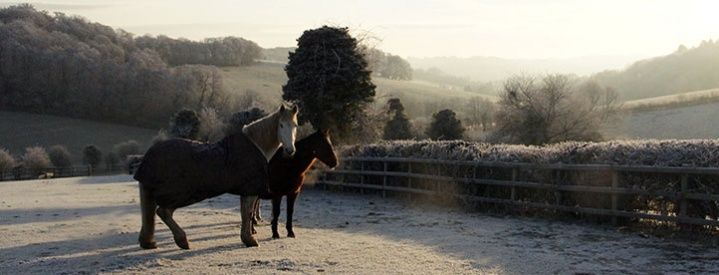
Winter is no wonderland for our team here at The Horse Trust
As the seasons change and the cold weather starts to hit, it’s time to be more aware of the common horse problems that can occur over the winter months.
Over 100 horses, ponies and donkeys take residency here at The Horse Trust, therefore management and spotting early signs of such conditions like mud fever and rain scald are important to make sure all our horses stay happy and healthy.
Here are a few helpful pointers for these two conditions commonly found at this time of year.
Mud fever
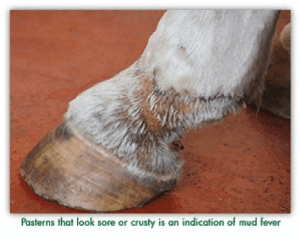 When you need to put away your jodhpur boots and dig out the wellies, tis the season for mud! Pastern dermatitis or more commonly known as mud fever is caused by bacteria invading damaged skin in the pastern areas. The condition refers to a range of skin reactions to a number of varying irritants, which thrives in muddy wet conditions. The infection can stay hidden within the skin, which can then become active when the skin is compromised, typically by prolonged wet conditions. If the pastern looks sore or crusty then it could very well be mud fever. In very severe cases, the leg can become swollen and painful when touched.
When you need to put away your jodhpur boots and dig out the wellies, tis the season for mud! Pastern dermatitis or more commonly known as mud fever is caused by bacteria invading damaged skin in the pastern areas. The condition refers to a range of skin reactions to a number of varying irritants, which thrives in muddy wet conditions. The infection can stay hidden within the skin, which can then become active when the skin is compromised, typically by prolonged wet conditions. If the pastern looks sore or crusty then it could very well be mud fever. In very severe cases, the leg can become swollen and painful when touched.
What shall I do now?
If you have seen these signs here is what to do next. If the legs are hairy, a good place to start is by gently clipping around the area of the legs. A clean, hairless area will help make the treatment more manageable. Use warm water and a chlorhexidine scrub like Hibiscrub to gently clean the area. Do not scrub the skin! Leave it to lather for around 10 minutes then gently rinse it off with warm water. Pat dry with a towel and repeat once to twice a day. From then on, try and keep the area as dry and clean as possible. Here at The Horse Trust we have specific areas such as covered barns or hard standing areas where the horses will go when they are suffering with this condition. If you do have to put your horse out, put Vaseline or udder cream onto the area as it will act as a barrier to the mud. There are numerous creams that can be applied once the affected area has been cleaned and dried thoroughly. Creams including Zinc castor oil and various commercial anti-inflammatory ointments can all aid the healing process. If there is no improvement within 5 days, it’s best to contact your vet as they may need to supply antibiotics to help clear it up.
Rain scald
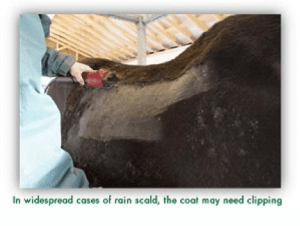 Wearing your waterproofs and your hat to hide from the rain? Well, this is the time of the year when rain scald is more common. Bacteria can invade the horse’s wet skin making it sticky. The hair then becomes matted forming scabs over the back, hindquarters and other areas of the coat that become wet. Horses that have been neglected (welfare cases) or those that have other underlying health issues may be more likely to get rain scald as a secondary problem as their immune system is less able to fight infections. Our Polly suffered horrendous rain scald when she arrived with us as a rescue case (pictured right).
Wearing your waterproofs and your hat to hide from the rain? Well, this is the time of the year when rain scald is more common. Bacteria can invade the horse’s wet skin making it sticky. The hair then becomes matted forming scabs over the back, hindquarters and other areas of the coat that become wet. Horses that have been neglected (welfare cases) or those that have other underlying health issues may be more likely to get rain scald as a secondary problem as their immune system is less able to fight infections. Our Polly suffered horrendous rain scald when she arrived with us as a rescue case (pictured right).
What should I do now?
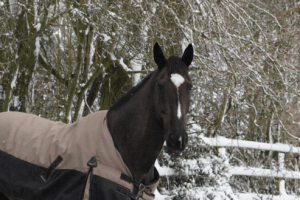 Well, you treat this condition similar to mud fever. Wash the area with an antibacterial solution and gently remove the scabs and pat the area dry. In widespread cases the coat may need clipping. The aim is to keep the horse’s coat as dry as possible to prevent rain scald. Clippingrainscald.jpgIf your horse is suffering from this bacterial infection, and you have to turn them out, make sure to put them in a waterproof rug, and check there are no leaks so they stay dry underneath. Do make sure not to rug the horse if the horse’s coat is already wet; you wouldn’t put a dry coat on when you are soaking wet! Let them dry before you rug them because if the horse’s coat is wet underneath it’s rug, it becomes a breeding ground for bacteria. If the condition is very bad, you may need to stable them. Again, with rain scald, contact your vet if there is no improvement within 5 days as your horse may need antibiotics.
Well, you treat this condition similar to mud fever. Wash the area with an antibacterial solution and gently remove the scabs and pat the area dry. In widespread cases the coat may need clipping. The aim is to keep the horse’s coat as dry as possible to prevent rain scald. Clippingrainscald.jpgIf your horse is suffering from this bacterial infection, and you have to turn them out, make sure to put them in a waterproof rug, and check there are no leaks so they stay dry underneath. Do make sure not to rug the horse if the horse’s coat is already wet; you wouldn’t put a dry coat on when you are soaking wet! Let them dry before you rug them because if the horse’s coat is wet underneath it’s rug, it becomes a breeding ground for bacteria. If the condition is very bad, you may need to stable them. Again, with rain scald, contact your vet if there is no improvement within 5 days as your horse may need antibiotics.
Winter is no wonderland for our team here at The Horse Trust and we hope that this winter will be kind to us. If you want some further reading on the common conditions that occur around winter time and top tips on how to keep your horse healthy, why not purchase ‘First Aid for Horses’ how to guide by Dr Debra Archer. Its first aid made easy and can be purchased via our online gift shop here.

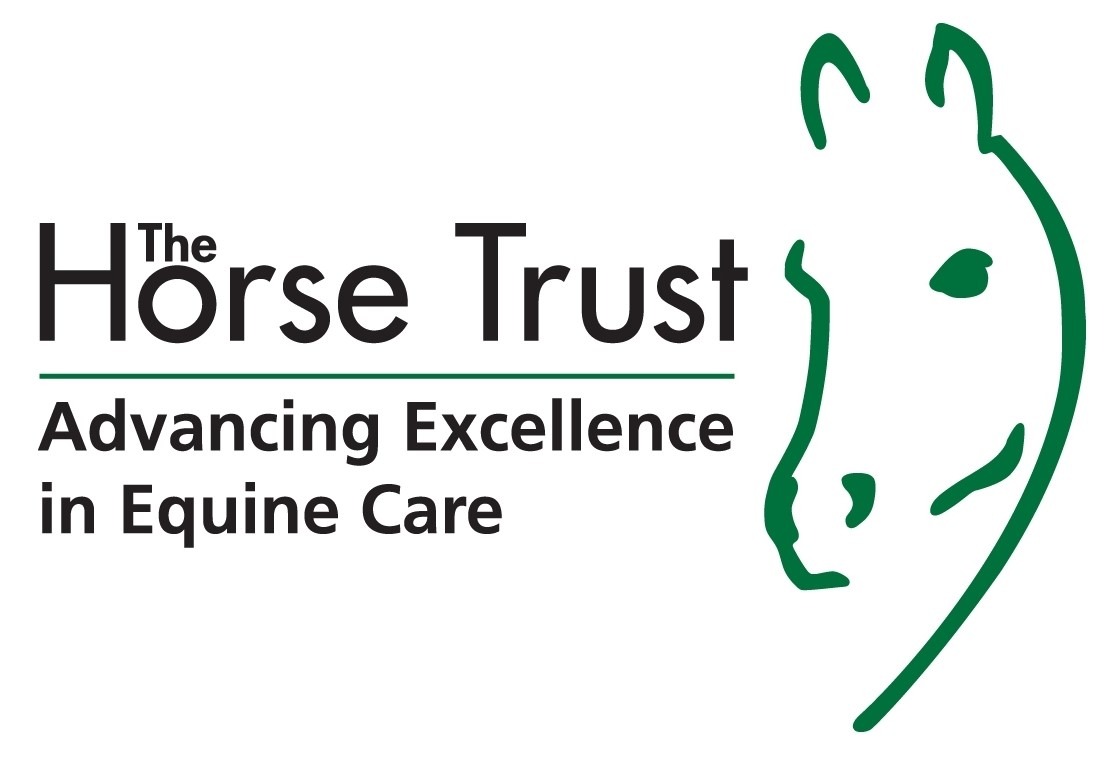

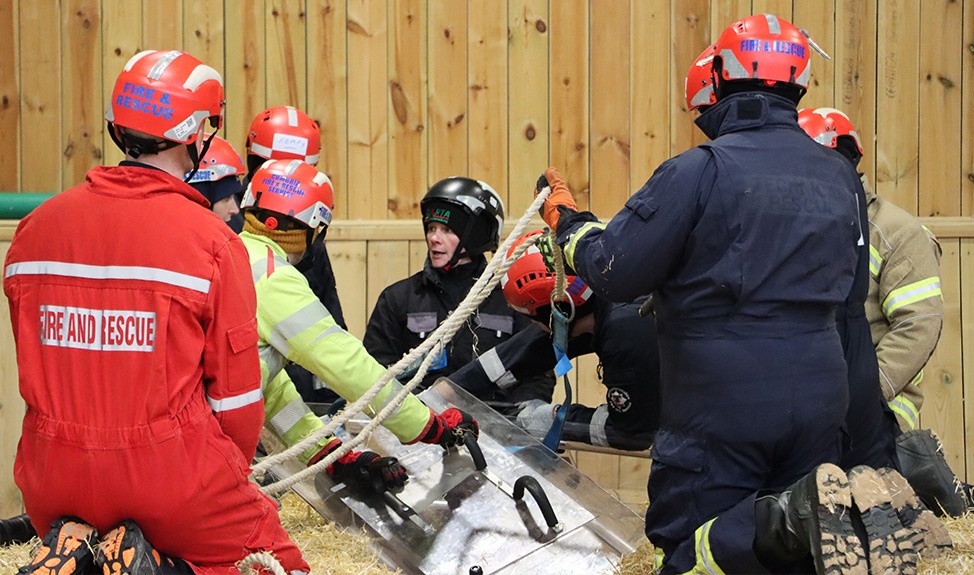











This Post Has 0 Comments